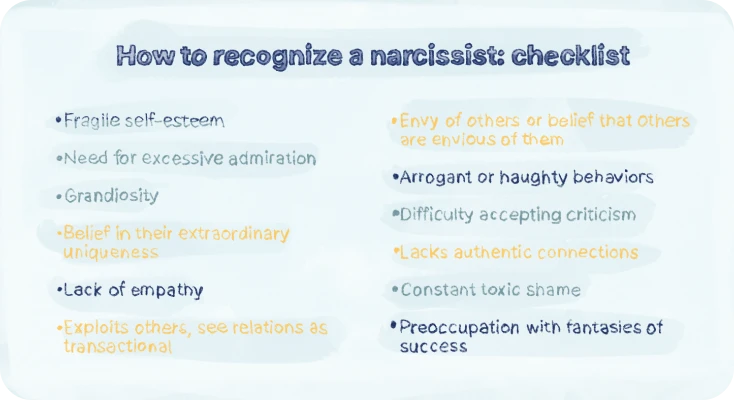Have you ever encountered someone who seems excessively self-absorbed, craves constant admiration, and lacks empathy for others? You might be dealing with a narcissist. Or you are in a relationship with them.
In this listicle, we will explore the 12 key traits of a narcissist.
What is narcissism?
Narcissistic Personality Disorder (NPD) is a deeply rooted psychological condition where a person craves admiration, lacks empathy, and maintains a fragile yet inflated self-image. This disorder affects how they interact with others—often in toxic and manipulative ways. [1]
“6.2% of the population is diagnosed with NPD,” says the Journal of Clinical Psychiatry. [2] But many of them are not diagnosed, meaning the actual figure may be higher. Still, any of us can be attracted by narcissists.
It’s important to note that narcissism exists on a spectrum. Everyone sometimes exhibits narcissistic tendencies from time to time. We all sometimes believe we are unique, strive for achievements, and wait for compliments from our loved ones. This can be a sign of healthy self-confidence.
However, when these tendencies interfere with a person’s ability to function and interact with others, a professional may diagnose it as a personality disorder. There are nine things that can be used to diagnose narcissistic personality disorder according to the Diagnostic and Statistical Manual of Mental Disorders (DSM-5).
Narcissistic personality disorder can be easily understood by thinking of it as a combination of a problem with controlling one’s own self-esteem and lack of empathy plus a lot of inner shame.
But each one is different, and there is no one profile or study of a narcissist’s personality. Some achieve phenomenal success. Some can not even manage to be autonomous.

How to recognize a narcissist? 12 narcissist traits
Here are some common 12 narcissistic traits:
- Fragile self-esteem
- Need for excessive admiration
- Grandiosity
- Belief in their extraordinary uniqueness
- Lack of empathy
- Exploits others, see relations as transactional
- Envy of others or belief that others are envious of them
- Arrogant or haughty behaviors
- Difficulty accepting criticism
- Lacks authentic connections
- Constant toxic shame
- Preoccupation with fantasies of success
Self-perception and internal struggles
1. Fragile Self-Esteem
At the core of NPD is shaky self-esteem. Despite their grandiose exterior, which may present as completely conceited, narcissists often rely heavily on external validation to maintain their self-worth.
Yes, despite their outward confidence, narcissists often grapple with deep-seated insecurities. They depend on others to feel good about themselves. This fragility can lead to significant emotional distress when their self-image is challenged. What’s more, these insecurities fuel their need for validation and admiration, driving many of their narcissistic behaviors.
2. Preoccupation with Fantasies of Success
A lot of the time, narcissists daydream about having unlimited success, power, intelligence, beauty, or the perfect love. While having aspirations and goals is healthy, narcissists take this to an extreme, often losing touch with reality in the process.
But, focusing on these fantasies can make them lose track of what they actually accomplish. They may make grandiose claims about future successes without taking concrete steps to achieve them. Others may find this annoying because the narcissist’s fantasies don’t always match their actions.
3. Wholesome toxic shame
Yes, they are secretly suffering from shame, believing that they are fundamentally flawed and that others will always judge them negatively.
Everyone, including sometimes the narcissist themselves, may be unaware of the buried insecurities, fears, and rejected characteristics that the narcissist is so diligent about hiding.
To maintain this fragile facade of self-esteem, or false self, a narcissist tries to hide their vulnerabilities. But in the end, this prevents them from being totally honest and open. It seems like they are not honest or do not have integrity.
4. Difficulty Accepting Criticism
One of the most telltale traits of narcissism is an intense aversion to criticism. For narcissists, any form of critique, no matter how constructive or well-intentioned, feels like a personal attack. This trait stems from their fragile self-esteem and an overwhelming need to maintain a grandiose self-image.
When confronted with criticism, a narcissist may react with anger, defensiveness, or even try to manipulate the person providing the feedback. They may dismiss valid concerns, make excuses, or completely deny any wrongdoing.
Ego needs and validation
5. Grandiose Sense of Self-Importance
One of the most “famous” traits of narcissists is they tend to have an exaggerated sense of self-importance. This is also known as “grandiosity.”
They may believe they are exceptional and superior to others, frequently boasting about their achievements and talents. However, this grandiosity may not be grounded in reality; rather, it stems from an inflated self-view.
Think of that person who constantly name-drops or brags about their “exclusive” networking events. It’s like they can’t stop talking about themselves (even if the accomplishments aren’t all that noteworthy).
6. Need for Constant Praise and Admiration
Narcissists have an “insatiable hunger” for admiration and validation. They seek constant recognition and praise to bolster their fragile self-esteem.
Needless to say, this need will not be shown directly since they can not be seen as the ones who need praise because they feel so ashamed inside and their an inflated sense of self-worth.
However, this can result in manipulative behaviors to draw attention and accolades from others. But when attention and praise are not available, they tend to be in “narcissistic depression,” where they feel empty, constantly bored, or restless.
7. Sense of Entitlement and Uniqueness
Ever met someone who thinks the world owes them something? Narcissistic people typically have an unreasonable expectation of favorable treatment or compliance with their wishes. (It’s like they’re walking around with an invisible crown on their heads.)
Typically, it’s because narcissists perceive themselves as unique and special. They might also think that only other special or high-status people can understand them or should be their friends. When they do not receive the special treatment they expect, they frequently become frustrated or angry and irritated.
Interpersonal dynamics and social behavior
8. Lacks Empathy
Another hallmark trait of a narcissist is their struggle to empathize. They genuinely find it hard to recognize or care about other people’s feelings. It’s like they’re emotionally colorblind in a world full of vibrant emotions.
“Their lack of emotional empathy makes it easy for narcissists not to care when they hurt other people. They are untroubled that the price of their self-esteem is a willingness to devalue or destroy other people’s happiness.”- says Elinor Greenberg, Ph.D, author of Borderline, Narcissistic, and Schizoid Adaptations: The Pursuit of Love, Admiration, and Safety.
9. Exploits Others
A limited or lack of empathy and regard for others’ feelings often leads narcissists to exploit relationships for personal gain. They may take advantage of friends, family, or colleagues to achieve their own goals, showing little remorse for their actions.
Typically, narcissists perceive people as tools to get what they want. They see any relationship as transactional. It could happen because of childhood trauma; they could be children of narcissistic parents.
For example, during their childhood, they were treated differently from other siblings or praised only when they did what their parents wanted from them, which could cause golden child syndrome. Therefore, they grew up inherently believing they were special and worthy of excessive attention.
10. Envy and Believes Others are Envious of Them
People who have narcissistic tendencies are often envious of others’ achievements and believe that others feel the same way about them. But why they are so jealous? This twisted thinking helps them to avoid deep inner shame and poor self-worth.
Shame makes them feel like they are not good enough, asking themselves, “Why am I such a failure” or “ Why am I not good at all?” But when they are jealous, their attention shifts to something outside of them.
11. Lacks Authentic Connections
Another significant trait of narcissistic-oriented people is their self-centered nature, which makes it hard for them to build genuine relationships. While narcissists may appear charming and sociable on the surface, their relationships often lack true emotional intimacy and empathy.
Instead of seeing others as unique people with their own needs and feelings, they see them as people to admire or as tools to help them reach their goals. As a result, their relationships often feel one-sided and superficial, based more on what others can do for them than on mutual respect or affection.
12. Difficulty with Emotional Regulation
A less discussed but significant trait of narcissistic behavior is difficulty with emotional regulation. Narcissists often experience intense emotional reactions and struggle to manage their feelings in healthy ways. This trait may show up as sudden outbursts of anger, prolonged periods of sulking when things don’t go their way, or dramatic mood swings.
Is it them or you? Understanding narcissistic traits in yourself
If you were truly a narcissist, you probably wouldn’t be worried about it. If you’re genuinely concerned about Narcissistic Personality Disorder, it’s more likely that you’re experiencing the effects of being in a relationship with someone who has most of these 12 narcissistic traits.
It’s emotionally draining and forces you to adapt to their way of thinking. You might find yourself saying or doing things you’d never do in other situations. This doesn’t mean you’re a narcissist. It can mean the relationship is affecting your mental health.
However, if you do honestly recognize narcissistic traits within yourself, awareness is the first step. Talking to a mental health professional is always a good idea if you are worried about your behavior or mental health. They can provide support and guidance tailored to your specific situation.
4 myths vs. facts about narcissistic traits
Myth #1: Narcissism and NPD are the same thing
In fact, narcissism exists on a spectrum. Everyone may have personality traits that are associated with narcissism, and they may arise occasionally.
However, to be diagnosed with NPD, you need to have most of the criteria outlined in the Diagnostic and Statistical Manual of Mental Disorders (DSM-5), and they should persist and actively influence your life. So, people who have narcissistic traits don’t always have NPD.
Myth #2: Narcissists are unable to form relationships
The reality is that people with narcissism can make friends and date other people. Certain narcissistic traits may cause a struggle to maintain healthy and long-lasting relationships.
However, people who have been diagnosed with NPD might find it harder to connect with others since their symptoms are affecting them and the people around them. [3] Symptoms like lack of empathy and grandiosity can severely impact the ability to form relationships.
Myth #3: People with narcissism are extremely self-confident
The fact is, many people with narcissistic tendencies may feel like they are better than others, but this is also a way for them to mask deep insecurity, fear of failure, and self-doubt. Many narcissistic behaviors, such as arrogance or grandiosity, are mostly compensatory mechanisms used to shield themselves from feelings of toxic shame.
Myth #4: Narcissists are always aggressive or abusive
Typically, behavior like aggressiveness and abusiveness are not universal traits among narcissists. While some may exhibit these behaviors, others may not. Some who exhibit covert narcissism traits, for example, are otherwise—they are good at cooperating, and they might appear humble and shy.
How to deal with someone with narcissistic traits
It’s possible to deal with a narcissist in your life. Check out these 5 tips to help you feel supported.

1. Get to know more about them and your reactions to them
Initially, narcissists are charming, which makes it easier to overlook their poisonous behavior. Once they know you, they may be hostile, manipulative, and demeaning. Perhaps you may even begin to question your own actions, asking, “How did I become so vulnerable to them?”
- Learn to recognize narcissistic personality traits to notice red flags in a relationship before it gets too serious. Save this article with the list of narcissistic traits.
- Learn more about yourself and your emotional reactions. For that, you can take self-discovery tests from the Breeze app to get to know more about whether you have childhood trauma, your EI score, or even if your relationships are abusive.
- Talk to a therapist if you think you need help to deal with the effects of narcissistic people. Starting therapy can help you feel seen and like you aren’t “crazy” for how you feel. Therapy can help you understand and manage your emotions.
Additionally, discover the shared strategies narcissists employ to minimize their effect on you:
- Gaslighting is a denial of reality or questioning of your perspective. Know how they could turn events to cause you to question yourself.
- Love bombing and devaluation: They show partners love and attention only to subsequently devalue them. Knowing this cycle will enable you to break free from the highs and lows.
- Blame shifting: They attribute an emotional reaction to someone else. Steer clear of pointless arguments and from caving in to their need for attention.
2. Hold your ground with unyielding boundaries
Narcissists will test your resolve, often subtly. A boundary isn’t just saying, “Don’t do that”—it’s consistently refusing to bend when they try to charm, guilt, or manipulate you into submission.
For that, practice saying “no” without overexplaining. If they push for something unreasonable, respond calmly: “That doesn’t work for me.” Be prepared for pushback, but don’t engage in debate. A boundary isn’t a negotiation.
2. Protect your inner world
Guarding your thoughts and feelings isn’t cold—it’s self-preservation. Share only what’s necessary, and always with awareness of how they might twist it. For example, deflect politely if they ask about a sensitive topic: “I’m working through it, but I’m fine for now.”
Create a mental checklist before sharing personal details:
- Does this person need to know this information?
- Could they use this against me?
- Will sharing this bring me peace or vulnerability?
3. Master the art of emotional neutrality
Emotional reactions are their currency. The less you respond with anger, frustration, or vulnerability, the less satisfying you are as a target.
For example, you can use the “Gray Rock Method” strategically. With this method, you act like you are not interested or responsive on purpose so that someone who is abusing you will lose interest in you.
How to do it:
- Keep conversations superficial and avoid emotional reactions. When they start drama, respond flatly, unengagedly: “Oh, I didn’t notice,” or “I’m not sure what to say.”
- Provide minimal responses—stick to facts and avoid elaboration. Avoid sarcasm or passive aggression, as they just fuel the fire. Your goal is to be uninteresting in their eyes.
- Or redirect conversations to neutral topics or end interactions when they become toxic.
5. Cultivate your escape hatch
Still, dealing with a narcissist for a long time can be draining, so it is important to have a strong support system or backup plan to keep your emotional strength up.
For instance, you can invest time in relationships that recharge you and offer support without judgment. Let these connections remind you of your value outside the narcissist’s distorted reality.
If it’s a relationship you can’t easily leave (e.g., family or work), create mental and physical spaces where they can’t reach you. Find moments of joy, whether through hobbies, therapy, or simply taking a walk alone.
References:
- Mitra P, Torrico TJ, Fluyau D. Narcissistic Personality Disorder. StatPearls Publishing; 2025 Jan
- Stinson FS, Dawson DA, Goldstein RB, et al. Prevalence, correlates, disability, and comorbidity of DSM-IV narcissistic personality disorder: results from the wave 2 national epidemiologic survey on alcohol and related conditions. J Clin Psychiatry. 2008
- Kacel EL, Ennis N, Pereira DB. Narcissistic Personality Disorder in Clinical Health Psychology Practice. Behav Med. 2017
Disclaimer
This article is for general informative and self-discovery purposes only. It should not replace expert guidance from professionals.
Any action you take in response to the information in this article, whether directly or indirectly, is solely your responsibility and is done at your own risk. Breeze content team and its mental health experts disclaim any liability, loss, or risk, personal, professional, or otherwise, which may result from the use and/or application of any content.
Always consult your doctor or other certified health practitioner with any medical questions or concerns
Breeze articles exclusively cite trusted sources, such as academic research institutions and medical associations, including research and studies from PubMed, ResearchGate, or similar databases. Examine our subject-matter editors and editorial process to see how we verify facts and maintain the accuracy, reliability, and trustworthiness of our material.
Was this article helpful?





